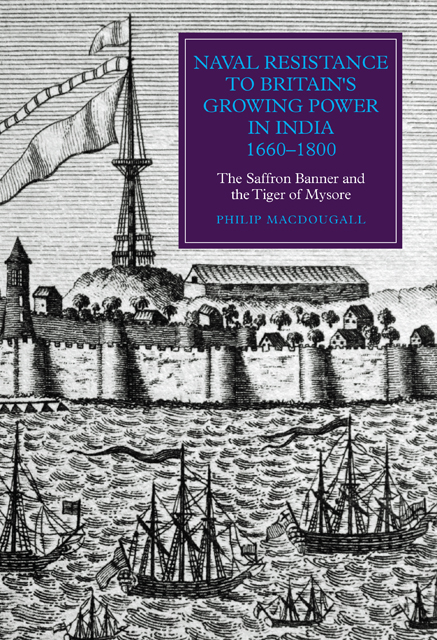 Naval Resistance to Britain's Growing Power in India, 1660–1800
Naval Resistance to Britain's Growing Power in India, 1660–1800 Book contents
- Frontmatter
- Contents
- List of Illustrations
- Abbreviations
- Chronology
- Maps
- Preface
- Part I Early Naval Resistance: The Historical Background
- Part II The Saffron Banner: Irregular Naval Warfare against an Emergent Britain
- Part III The Tiger of Mysore: A Conventional Navy to Oppose British Dominance
- Conclusion
- Bibliography
- Index
- Worlds of The East India Company
3 - Bombay: A Poor Little Island
Published online by Cambridge University Press: 23 February 2023
- Frontmatter
- Contents
- List of Illustrations
- Abbreviations
- Chronology
- Maps
- Preface
- Part I Early Naval Resistance: The Historical Background
- Part II The Saffron Banner: Irregular Naval Warfare against an Emergent Britain
- Part III The Tiger of Mysore: A Conventional Navy to Oppose British Dominance
- Conclusion
- Bibliography
- Index
- Worlds of The East India Company
Summary
These islands are in number seven; viz. Bombaim, Canorein, Trumbay, Elephanto, the Putachoes, Munchumbay, and Kerenjau, with the Rock of Henry Kenry arising as so many mountains out of the sea.
Dr John Fryer, c.1673
3.1 Bombay formally replaced Surat as the EIC’s main trading centre in 1687 and was rapidly expanded from that date onwards. This late eighteenth-century engraving not only shows the fort which lies at the head of the peninsula but also the dockyard, which is seen towards the centre. This dockyard was particularly important for British control of the Indian Ocean, undertaking construction work on many warships for the Bombay Marine and also a small number for the Royal Navy.
Bombay, at that time an archipelago formed of seven islands with the more central and largest of these bearing the name Bombay, was first acquired by the English in June 1661. Although nowadays a major port, financial centre and the fourth most populous city in the world, this was not how it appeared in the seventeenth century. The seven islands were at that time sparsely populated and separated by an area of swamp, covered at high tide and known as the ‘Flats’. It was only as a result of a series of major land reclamation projects that took place from the eighteenth century onwards that the modern-day city of Mumbai emerged to develop into a twenty-first-century mega-city. In 1661 it would have taken someone with remarkable forward vision to predict such an astonishing transformation given that the islands formed an ideal breeding ground for malaria-carrying mosquitoes. Indeed, it was said of Bombay at that time that a mere three years was the average life-span of a European resident, with John Ovington, a chaplain on board a Company ship that arrived in 1690, describing the islands as ‘so very unhealthful ’tis certainly a mortal enemy to the lives of Europeans’.
The Portuguese had certainly viewed Bombay as having little potential when they first took possession of the islands in 1534; ceded to them by Bahadur Shah of Gujarat at the time when he was seeking out the Portuguese as an ally against the Mughals.
- Type
- Chapter
- Information
- Naval Resistance to Britain's Growing Power in India, 1660–1800The Saffron Banner and the Tiger of Mysore, pp. 46 - 60Publisher: Boydell & BrewerPrint publication year: 2014


